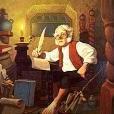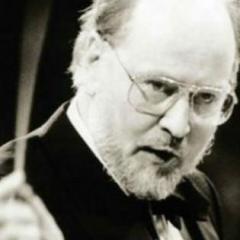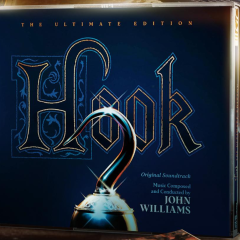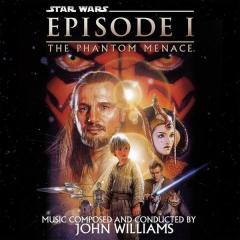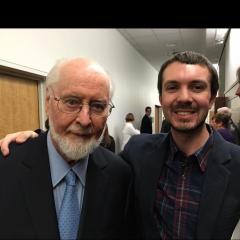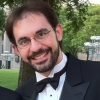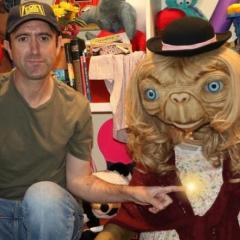-
Posts
2,963 -
Joined
-
Last visited
-
Days Won
14
Reputation Activity
-
 Uni reacted to karelm in Music Theory: Roots and Pursuits
Uni reacted to karelm in Music Theory: Roots and Pursuits
As for me, I always wanted to be a composer once I realized it was possible (in my youth I thought composers had died out long ago and no one was still doing it). In 7th grade I started trumpet in my school band but switched to trombone as I really wanted to play that. In fact, the bass trombone is my instrument. I started composing while in high school and my first work was an ambitious 45 minute long symphony. It was certainly flawed and was repurposed while in college as a set of piano etudes. In college I studied Aerospace Engineering and loved all the maths and science courses especially orbital mechanics, fluid dynamics, physics and chemistry and of course astronomy. BUT I pulled out and went into music instead focusing on composition and a few years of piano. I wanted to pursue classical composition so took about 7 more years of piano and composition privately with professors at the local conservatory but eventually went for a graduate program in music. I play in symphony orchestras and make my living as a working composer in film, concert stage, and video games and have worked as composer, orchestrator, and arranger. Like most here, I count a mentor as a very important part of my development both personally and professionally. Someone with established credentials and who "believed" in me and saw something and nurtured it.
The career is a slow slog. At times it is very discouraging but you look back at the year in retrospect with pride of lots of accomplishments that you forget about in the day to day slog. I am very lucky to do what I do and love it very much but it can be so frustrating as a career. You have to distance yourself somewhat from your personal opinions of the work since it is a business but then find outlets somewhere else. For me, that comes in the form of performing orchestral music and also writing concert music that might not pay much if anything.
Video games are great fun because they are almost always written in the style of movies from the past and tend to have decent recording budgets. All these projects are very intense schedule wise and the pressure is extreme. I believe one must have a lifestyle of learning in this field and I'll tell you, JW even in his 80's studies music to this day and constantly seeks to learn something about how to improve his craft. He perfectly embodies the attitude of eternal student and strives for greater control, brevity of ideas, skill, etc. I believe that is essential attitude. Goldsmith was also like this. Basically the point of the study is not to mimic/imitate someone else but that is part of the process of learningto unravel what others have done and ultimately take elements and make it your own. School is excellent because in my experience it encouraged experimentation in a relatively safe environment (this was my experience and I know others found school constricting). We were routinely told that if you know what it will sound like then try something else. Failure is good. I study scores and continue to try new music even if I don't like it. For example, I recently completed a project with a rock score which I never listen to that style. I am more the grand orchestral style but I enjoyed working with a rock band and pushing myself to try something different.
I believe you have to be self motivated to learn this stuff. That doesn't necessarily mean you don't need school but even in school, you have to want to master the material and a lot of this comes from your own pursuits. Some classmates were very vocal that they learned nothing in school and I found this to be more a reflection of their attitudes than the education process. Similarly, there is only so far self study can take you. Having someone with wisdom, experience, patience, and knowledge walk you through the material will certainly expose more than just walking through it on your own. Also important, we learn from peers so classes are full of others who made a mistake so you don't repeat it or otherwise did something you never would have thought of so you explore it further. School also is important for your first opportunities because there is a network that you are part of. It was probably the most important stepping stone for me.
-
 Uni reacted to Ludwig in Music Theory: Roots and Pursuits
Uni reacted to Ludwig in Music Theory: Roots and Pursuits
Oddly enough, I'll be the third person in this thread to say I started out in science with an interest in physics who then made music my primary pursuit. I started out with years of study on the piano but was always keen on theory, so veered more towards composition. Once I decided science was not the route for me, I took private composition lessons then did a Bachelor degree in composition, taught piano and theory privately and at a community school for a couple of years, then went back to school to study music theory specifically at the graduate level.
Even with my attraction to theory, however, I should say that, in my first years in music, I spent many thousands of hours doing things to develop the essential musical skills of harmonic, melodic, and rhythmic dictation by ear, playing chord progressions at the piano, singing melodies and rhythms at sight, and analyzing harmony to the point where I could see chords as immediately as words on a page. These are all skills I am very glad I have today and I wouldn't trade them for anything. They are fundamental to the way I understand music, which, as it is with TheGreyPilgrim, is like a language. In other words, my natural response to hearing music is much like the way we understand someone speak - for the overall meaning we get without having to stop and think, rather than for the theoretical grammar and syntax. For anyone aspiring to learn a higher level of music theory, I'd advocate for developing these skills to a very high degree before learning more about theory itself. For me, those were all self-taught even though I was in a degree program, so a university education is not a requisite for such a pursuit.
Analyzing harmony is a skill that is usually acquired with the help of a book. You can learn an enormous amount from even a single textbook on the subject, especially one of the newer ones by authors like Laitz, Roig-Francoli, and Clendinning and Marvin. Books like these are aimed at Bachelor programs where you complete the material in four semesters, which is generally two years of study. But a keen student could easily go through it much faster. Learning harmony in this kind of detail is an essential musical skill for anyone aspiring to learn about the higher levels of theory.
Beyond learning these essential skills, one may ask how one "sees" things in a piece of music - patterns, relationships, and so on - that go further than the mere chord labels we might ascribe. In other words, how does one develop the ability to analyze music in a meaningful way? In graduate school, I had a professor who always encouraged us to look for more musical relationships than we thought existed in a piece, especially those at more of a long range that involved larger swaths of music than just a few notes in a bar. "Keep going", he would always say when we were analyzing a piece in class. Maybe a short motive that appears within a bar is also used across several bars at the same time, or even across a whole section or an entire piece. I cannot tell you how many times I have been rewarded in searching for relationships in this way. After a while, one begins to expect them and it becomes a habit to seek them out by considering all kinds of possibilities.
But in the end, any analysis must always agree with those intuitions we have about a piece that we formed just by listening to it without all these theoretical "blinders". That is, an analysis should always fit the music and help us to understand why it is we hear a piece the way we do, so that we may better perform, compose, listen to, teach, and learn about music. That, to me, is the single greatest benefit of music theory.
-
 Uni reacted to Dixon Hill in Music Theory: Roots and Pursuits
Uni reacted to Dixon Hill in Music Theory: Roots and Pursuits
This kind of question inevitably leads me to tell my whole life story and philosophy of music. Let me try to be succinct for once.
I had various forms of elementary musical education during my formative years.
I majored in physics in college but quickly took on a minor in composition when I realized that's what I actually wanted to do. Through that I had access to private composition lessons, and courses in harmony, ear training (fear training), music history/literature, orchestration, and conducting. And I sat in on whatever performance courses I could, both for keyboards and also all of the instruments I don't play.
After I graduated I bummed around for a while in NYC before a truly remarkable man and composer took me on as a student. During this time I learned more about that idea of thinking about music rather than studying it. I also got to refine what I already knew, discover the joys and annoyances of analysis, and become slightly less horrible as a conductor. But most important was the element of being taught to truly think about music in the right way. I said I'd say more on this but I'm realizing I can't. If I could, if anyone could, becoming a truly mature composer would be a hell of a lot easier. I also learned here how to actually go about creating something from nothing. That's...a matter for another thread.
After that period sadly but inevitably ended I continued to bum around, playing with friends in chamber groups or jazz groups, writing here and there and performing what I wrote or bugging others until they did. Got myself into another good relationship with another remarkable man. His studio got me access to serious performances of my stuff and also (infrequent) glimpses into film scoring.
What I actually "do" now, then, is more of the same. Playing, writing, and getting stuff performed. I'm in LA now though and it's even more promising, especially on the scoring front. And I've gotten pretty good at doing mock-ups which is frankly much more efficient than having to rely on others if you want a performance to pass around and get good attention. I kind of hate doing it though.
The way I learned happened to be perfect for me. I don't think I can advise anyone on how to learn beyond saying that you should find out what the best way is for you and do that. Had a brief stint as a composition teacher...obviously wasn't my thing. Some people thrive in a heavily academic environment. I responded more to a relatively improvised method. But one analogy I always use, and I think anyone can benefit from it, is to think of music as a language. Approach it in the way you might learn a new tongue. Or better yet in the way you learned your native one. You can speak before you can spell. You can form verbal thoughts before you understand how. Internalize what music is - manipulation of thought through sound - and then learn about the why. The why is just a tool. But it's not how you create.
-
 Uni reacted to KK in Music Theory: Roots and Pursuits
Uni reacted to KK in Music Theory: Roots and Pursuits
Great thread. I took a bunch of piano exams at the RCM here, through which I learnt rudimentary theory on the side. Did some performing here and there, but I'm not that great a pianist. I am a better flautist though, principal in my high school band, got involved in a couple of ensembles and chamber groups in my community. i got most of musical theory from my piano theory exams though, but I never went into any advanced harmony or anything.
During high school, I dabbled a bit in composition. My music teachers took notice of this, and encouraged me to write for some chamber groups, but learning-wise, it's all basically self-taught. I didn't think about pursuing music in university, I don't think I was a strong enough pianist for that anyways (entrance is performance based), but maybe as a flautist?
The point is, as much as I loved it, I couldn't see music as my major career path. And now I'm majoring in biochemistry. I was in my university orchestra as a flautist for my first year, but stopped in my second (and current) year just because my workload was getting overwhelming, and I had to prioritize. Now I still compose for small local short films and stuff, and I try to get some work done on some personal projects of mine whenever I get the chance. But there is so much for me to learn still. I just wish I had more time to pursue it more extensively. And this board of full of folks with a vast amount of know.edge that I try to soak up whenever I can.
I definitely want to pursue composition in a more major way at some point in my life (whether it be dabbling in Hollywood or the concert hall). The thing is, it's a lot tougher than it sounds...
But this thread is cool because it'd be nice to offer resources (PDFs, texts, etc) about more advanced harmony stuff, or techniques, etc.
-
 Uni got a reaction from Gnome in Plaid in Music Theory: Roots and Pursuits
Uni got a reaction from Gnome in Plaid in Music Theory: Roots and Pursuits
Reflections (and a couple of questions) for a quiet Wednesday evening. . . .
I spent some idle time this afternoon thinking that music resembles a number of other activities in that it's something that can be enjoyed on myriad levels. For a comparative example, consider chess. One can learn the rules of the game and the moves of the pieces in five minutes, and out of that can enjoy hours of playing against another amateur with similar skills and understanding. But they don't have to leave it at that. They could begin to study fundamental strategies to improve their abilities and comprehension. Eventually they might take to learning a wide range of openings, and advanced strategies, and start to take on more experienced opponents, even entering tournaments just for fun. They could open the encyclopedic window into the classic games of Kasparov and Morphy and Capablanca and Fischer, dissecting the classic matches to better understand how grandmasters think. And after working through all that . . . a student might still have only scratched the surface of all there is to learn about the game.
Music's a lot like that. Most people spend their whole lives just listening, and finding plenty of fulfillment in it. Beyond that, a guitar and the basic I-IV-V chords--a short afternoon's worth of effort--can make a musician out of anyone. (There are rock stars out there making millions with little more than this basic palette at their disposal.) A little more time and effort can open an understanding of intervals, scales and modes, and the circle of fifths--the ground-level components of all music. Then comes the deeper stuff, the higher theory, the more complex chordal relationships, the study of the classical and modern masters. And after working through all that . . . a student might still have only scratched the surface of all there is to learn about the craft of making music.
So with that in mind, and considering the possibilities out there for people who want to move up to the next level (now that the internet has opened the door for people to learn in ways that weren't available twenty years ago), here are my two inquiries. First, since we have the privilege of watching the several theorists we have on this forum banter over the finer points of film music structure, I think it would be interesting to know how these folks gained their knowledge. What sort of training did you receive? Formal music education? College degree? Self-taught? Apprenticeships? Do any of you work in music as a professional vocation, or is it all a personal pursuit?
Second, as a practical matter for those who'd like to step up to the next level of learning, what would you recommend as a good means of learning higher music theory (beyond the fundamentals I mentioned--the circle of fifths, scales, basic chord progressions, etc.)? Are there online courses you've heard of or personally used? Is it something only long years of schooling can impart? Or are there other ways to go?
-
 Uni got a reaction from Dixon Hill in What is your favorite film from each decade starting with the 1920's forward.
Uni got a reaction from Dixon Hill in What is your favorite film from each decade starting with the 1920's forward.
I think he admitted as much shortly before his death.
-
 Uni got a reaction from Gnome in Plaid in George Lucas on threat to movie industry
Uni got a reaction from Gnome in Plaid in George Lucas on threat to movie industry
He's right, of course. It's all paint-by-number these days. It's kind of hilarious, though, that he's the one saying it, after producing the most paint-by-number trilogy in history. One could make the argument that he's as guilty of fostering the current situation as anyone in Hollywood.
-
 Uni got a reaction from Marian Schedenig in Craig Safan's The Last Starfighter - New Intrada Complete January 2015
Uni got a reaction from Marian Schedenig in Craig Safan's The Last Starfighter - New Intrada Complete January 2015
If you're any kind of film score collector, then at some point along the way you've picked up a score you've never heard for a movie you haven't seen—either because you're going completist for a certain composer, or because it's part of a series you like but haven't finished seeing, or whatever. You know that some of those turn out to be rotten, or at the very best too mediocre to care much about. On the other hand, you've probably had at least one iteration of that delightful experience that happens when you stumble across a truly great score without having any preconceived ideas it would be so good.
If you've never seen the movie or heard the score before, I can assure you The Last Starfighter will be one of those experiences. It'll probably make you want to see the movie once you've heard it—and, if you really respond well to the score, you may even find the movie something of a letdown, which, while being a lot of fun, has become pretty dated, especially in the area of CGI effects. The music definitely elevates the material.
-
 Uni got a reaction from Wojo in Youtube clips
Uni got a reaction from Wojo in Youtube clips
This may have appeared on the site before, but it's the first time I've seen it. Hilarious (h/t to my lovely wife):
-
 Uni got a reaction from Ludwig in Youtube clips
Uni got a reaction from Ludwig in Youtube clips
This may have appeared on the site before, but it's the first time I've seen it. Hilarious (h/t to my lovely wife):
-
 Uni got a reaction from Bilbo in Rank The Indiana Jones Films
Uni got a reaction from Bilbo in Rank The Indiana Jones Films
Anakin/Vader didn't disappear. He was burned on a pyre, just like Qui-Gon, yet he reappeared at the end of ROTJ—just after his death, I might add, which I believe makes him the most rapidly recycled Jedi in the series.
I think you're overthinking this. Seems to me their "souls" or whatever find a way to return/communicate/hang out after they die, regardless of the manner of their death or the disposition of their bodies.
-
 Uni got a reaction from Hlao-roo in 2015: The biggest year in the history of blockbuster films?
Uni got a reaction from Hlao-roo in 2015: The biggest year in the history of blockbuster films?
They did, but it was widely rejected, and only illegal copies of it ever surfaced. It's known as the Das Boot booted reboot boot.
-
 Uni got a reaction from Bilbo in How do we feel about James Horner's Titanic?
Uni got a reaction from Bilbo in How do we feel about James Horner's Titanic?
On impulse, I gave it a 7. It's a very good score, but I think I've always sold it a bit short because of all the baggage it carries—i.e., the general "It's TITANIC!" vibe, Celine Dion crooning the love theme to death, that kind of thing. If it had been just another movie without all the hype, I probably would've had a much more open-minded disposition toward it. I admit, it's not a very fair perspective. Just the general impression I have.
Again, though, I do think it's a very good score. Not Horner's best—frankly, I think a film as big as this did deserve real vocals and a full orchestral job throughout—but it was certainly up to the job at hand. I really like the material in port and leaving port, and the final sequences of the film recalling her life, heading below the surface, and her reappearance in the stairwell hall. I do think it's a beautiful love theme, but (as I said) it's been tainted by overplay, and I've never thought it superior to the romantic material in Braveheart. (And the notion that nothing better has been written since is just silly.)
I agree with this. Another composer might've gone overboard on the epic scale, but I think Horner plays it right by keeping things on a more intimate level—reflecting the individual perspective of the larger event.
Also . . . I don't know where people got it in their heads that Horner is an arrogant guy. I've always seen him as very humble, ingenuous, and understanding that it's about what the director wants, not just the creative impulses of the composer. The reason he and Cameron clashed on Aliens wasn't creative differences; it was because what Cameron was asking for was a physical impossibility. And Horner's response to Cameron and Gale Ann Hurd, when they demanded more than he could give, was absolutely perfect. He managed to push back and still remain completely humble about it.
Ultimately, he was the right person for this job, and absolutely deserved the Oscar he got for it. Because it is a good score . . . and because, hey, it's TITANIC!
-
 Uni got a reaction from Glóin the Dark in RIP Robin Williams
Uni got a reaction from Glóin the Dark in RIP Robin Williams
I . . . simply can't believe this. What a shock. Makes you suddenly realize that he was one of those people in the scope of your life who was always just there. He's a fixture. The world just isn't the same without his manic energy.
I taped the full length of this interview (only partially shown here, and focused a little more on his mentor, Jonathan Winters) back in 1986. It's always stuck in my mind as a glimpse into what made Robin tick. I adore watching these two work--and most of all, watching them make each other laugh so much:
https://www.youtube.com/watch?v=iDJjq0Pd0RM
Man, I'm gonna miss this guy. . . .
-
 Uni got a reaction from Jay in 2015: The biggest year in the history of blockbuster films?
Uni got a reaction from Jay in 2015: The biggest year in the history of blockbuster films?
Wouldn't be a complete list without another Transformers movie. . . .
Jay, your updated list demonstrates the point that's been on my mind as I've read through this thread (a chore in itself, but that's what I get when I miss things the first time around). This started with the idea that 2015 was setting up to be a "giant blockbuster" year unlike any other. But that perspective assumed that 2015 would be a "peak" year of sorts. What prevents 2016—or '17, or '18, or onward—from being the same? I mean, they're at the point where they're rebooting franchises that have just started, or even have recently been rebooted and are now getting another reboot. Hollywood's lost the ability to think originally, but they don't care about that; they don't even have to worry about coming up with sequel ideas any more. Just hit the reset button and start the whole thing over. By 2025 (or sooner), we'll have summers packed with movies that'll be fourth-generation reboots of movies we don't want to watch now.
I love movies just as much as anyone else around here. What sucks is that there are so few being made anymore. Hollywood has become a literal attack of the clones. These days I have much more fun digging up movies from the 70s to watch with my kids, just so they can see that American cinema used to make films that had characters and told stories.
-
 Uni got a reaction from Marian Schedenig in The Jerry Goldsmith Memorial Appreciation Thread
Uni got a reaction from Marian Schedenig in The Jerry Goldsmith Memorial Appreciation Thread
What 1977 was to JW, 1979 was to Goldsmith. Not only did it feature TMP and Alien, it also had The Great Train Robbery, another golden score of his.
But like Williams, Goldsmith had been scoring films for ages prior to his greatest year—and I agree with pub that too much of his early and great material goes unnoticed and unappreciated. As much as I love TMP, Alien, Poltergeist, and the like, I also have a great love for A Patch of Blue, Lillies of the Field, In Harm's Way, Freud (which got some great replay in Alien),The Sand Pebbles, The Blue Max, Papillon, and so on. I aimed to become a JW completist some years ago, and have pretty much reached the limit on that goal; I've since decided to do the same with Goldsmith, and am getting along pretty well toward accomplishing that. Frankly, I don't know that I'd spend the effort (or the money) on such an enterprise with any other composer besides these two.
Goldsmith was one of the true greats, and while JW brought big, epic scoring back to the fore in '77 with Star Wars, Goldsmith was doing what he could to keep that spirit alive during the 60s and early 70s when everyone else—including Williams—was doing light jazz rom-coms, beach party soundtracks, funkadelic/tie-dye underscoring, bizarre, avant-garde sci-fi stuff (although Jerry had a hand in that kind of thing, too), or just straight-up temp tracking. Goldsmith's work during this period was a sort of bridge over all this "meh" that spanned the time between the epics of the 50s (from Steiner, Waxman, Rózsa, early Bernstein, and the like) and the resurgence of the epic scores in the late 70s and early 80s. Williams led the march during that revitalization, but it was Goldsmith who kept the door open during the "dark years," and we owe just as much to him for that as anyone else (including JW).
So yeah, I definitely honor the man and revere his work . . . enough to be a little put off by the phrasing in the poll and first post (pointing out the all-too-obvious fact that he's "dead and gone," and referring to him as "a certain dead film and television music composer." Is that really the best and most tactful way to start off a thread that's supposed to serve in memoriam. . . ?)
-
 Uni got a reaction from Dixon Hill in The Jerry Goldsmith Memorial Appreciation Thread
Uni got a reaction from Dixon Hill in The Jerry Goldsmith Memorial Appreciation Thread
What 1977 was to JW, 1979 was to Goldsmith. Not only did it feature TMP and Alien, it also had The Great Train Robbery, another golden score of his.
But like Williams, Goldsmith had been scoring films for ages prior to his greatest year—and I agree with pub that too much of his early and great material goes unnoticed and unappreciated. As much as I love TMP, Alien, Poltergeist, and the like, I also have a great love for A Patch of Blue, Lillies of the Field, In Harm's Way, Freud (which got some great replay in Alien),The Sand Pebbles, The Blue Max, Papillon, and so on. I aimed to become a JW completist some years ago, and have pretty much reached the limit on that goal; I've since decided to do the same with Goldsmith, and am getting along pretty well toward accomplishing that. Frankly, I don't know that I'd spend the effort (or the money) on such an enterprise with any other composer besides these two.
Goldsmith was one of the true greats, and while JW brought big, epic scoring back to the fore in '77 with Star Wars, Goldsmith was doing what he could to keep that spirit alive during the 60s and early 70s when everyone else—including Williams—was doing light jazz rom-coms, beach party soundtracks, funkadelic/tie-dye underscoring, bizarre, avant-garde sci-fi stuff (although Jerry had a hand in that kind of thing, too), or just straight-up temp tracking. Goldsmith's work during this period was a sort of bridge over all this "meh" that spanned the time between the epics of the 50s (from Steiner, Waxman, Rózsa, early Bernstein, and the like) and the resurgence of the epic scores in the late 70s and early 80s. Williams led the march during that revitalization, but it was Goldsmith who kept the door open during the "dark years," and we owe just as much to him for that as anyone else (including JW).
So yeah, I definitely honor the man and revere his work . . . enough to be a little put off by the phrasing in the poll and first post (pointing out the all-too-obvious fact that he's "dead and gone," and referring to him as "a certain dead film and television music composer." Is that really the best and most tactful way to start off a thread that's supposed to serve in memoriam. . . ?)
-
 Uni got a reaction from Ricard in R.I.P. Ken Thorne (1924 - 2014)
Uni got a reaction from Ricard in R.I.P. Ken Thorne (1924 - 2014)
How easy would it be to follow in the footsteps of JW? I can't imagine it would kind of pressure that would put on a man. But Thorne stepped up valiantly, and did wonderful things with the (admittedly masterful) source music he had to work with. I've always been grateful to him for that. Sad to hear of his passing.
-
 Uni got a reaction from Joni Wiljami in Empire Of The Sun - La-La Land 2CD
Uni got a reaction from Joni Wiljami in Empire Of The Sun - La-La Land 2CD
I've been wondering . . . maybe, in the same way most people weren't ready for Spielberg to shift into adult gear in 1987, a lot of scorepihiles (including loyal JW fans) weren't ready to go there yet with Johnny. I wonder if his later scores, particularly Schindler's List and Saving Private Ryan, have now brought people into the headspace necessary to recognize EOTS as a bona fide masterpiece.
Just idle speculation; for me, this score has always been a masterpiece.
-
 Uni got a reaction from Joe Brausam in Empire Of The Sun - La-La Land 2CD
Uni got a reaction from Joe Brausam in Empire Of The Sun - La-La Land 2CD
I've been wondering . . . maybe, in the same way most people weren't ready for Spielberg to shift into adult gear in 1987, a lot of scorepihiles (including loyal JW fans) weren't ready to go there yet with Johnny. I wonder if his later scores, particularly Schindler's List and Saving Private Ryan, have now brought people into the headspace necessary to recognize EOTS as a bona fide masterpiece.
Just idle speculation; for me, this score has always been a masterpiece.
-
 Uni got a reaction from Marian Schedenig in What's The Last Book You Read?
Uni got a reaction from Marian Schedenig in What's The Last Book You Read?
I'm tackling the Brother Cadfael novels again, my favorite historical mysteries of all time. Already on the third on (Monk's Hood). These are a set that simply cannot be overread.
Far and away my wife's favorite author. We actually got to meet him a few years ago at a local bookstore when Last Night in Twisted River came out.
-
 Uni got a reaction from Bespin in Some Star Wars questions
Uni got a reaction from Bespin in Some Star Wars questions
That's just it, though. As was the case with the original trilogy, everyone else who took a hand in adding to the mythology created much more interesting, entertaining, and dramatic material than Lucas ever did. His original treatment and scripts for ANH were even worse than what we got with TPM; if others hadn't come along and made it palatable and watchable, there never would have been an ESB. Most of the world knows better about how to handle storylines in that universe than its creator does. It's just unfortunate that he wielded so much power when it came time to do the prequels that he didn't feel he had to seek help from others in fashioning the story. The results, frankly, were predictable.
And that's why I have no fear that the new films will be great. They don't have Lucas around to magically turn them to bantha poodoo.
-
 Uni got a reaction from eaudissino in New Book: John Williams's Film Music: Jaws, Star Wars, Raiders of the Lost Ark, and the Return of the Classical Hollywood Music Style
Uni got a reaction from eaudissino in New Book: John Williams's Film Music: Jaws, Star Wars, Raiders of the Lost Ark, and the Return of the Classical Hollywood Music Style
Buh-yooo-tifully said! I'd read a book by anyone who could snap back at silly snark so effortlessly!
Can't wait to read this. This has to be the result of an enormous amount of effort and research on your part. JW certainly doesn't make it easy to do this kind of thing (as Thor has also attested). I gave some consideration to a book that would've been both a biography and a moderate musical analysis of John's influence on the medium, particularly through the years of his "Golden Age." It was actually Mike Matessino who encouraged me to take careful measure of the mountain I'd be attempting to climb, given the man's reticence to be interviewed or studied in any sort of close fashion. While I think it would've made a fascinating project, I also think Mike probably saved me many years of headaches.
I've ordered your book, and am looking forward to receiving and reading it.
-
 Uni got a reaction from Brock Lovett in James Horner Autograph *Success*
Uni got a reaction from Brock Lovett in James Horner Autograph *Success*
Yeah, he copies himself every time he does one of those. . . .
-
 Uni got a reaction from Dixon Hill in Empire Of The Sun - La-La Land 2CD
Uni got a reaction from Dixon Hill in Empire Of The Sun - La-La Land 2CD
He was truly great.
And that's why he was so great. Ebert was a Rumplestiltskin who spun crap movies into absolute gold in his reviews. His books I Hated, Hated, Hated This Movie and Your Movie Sucks made for some of the best and most entertaining reading about movies you could find.


